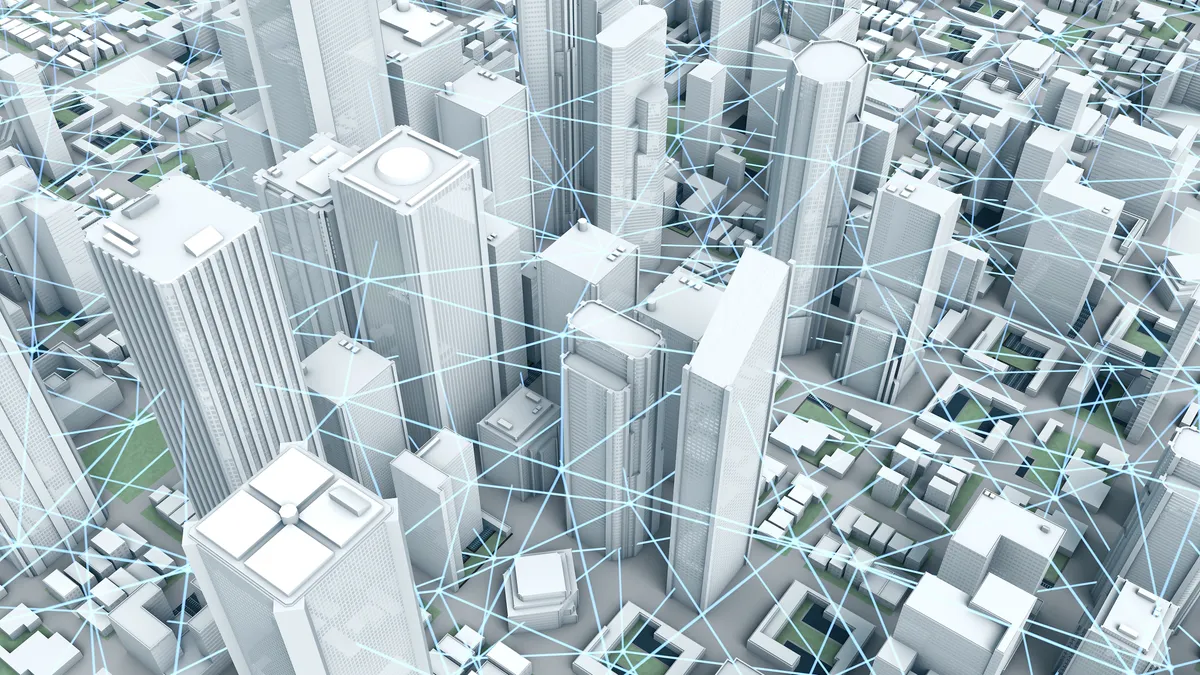Editor's Note: The following is a guest post from Casey Talon, a research director with Navigant Research.
Whether the topic is the internet of things (IoT), AI, or everything as a service, technology disruption in business is generating a lot of buzz.
It is no different in the world of real estate and facilities management. Today, competitive advantage for any business can be dependent on technology investment. The occupant experience in buildings can be the factor in choosing where customers work, study, shop, or even vacation. Thus, the commercial building is becoming synonymous with its tenants’ brand — which likely involves commitment to health and wellness, sustainability, technology innovation, or even productivity. Building owners recognize this pressure for technology-enhanced experience, and the result is new momentum in the smart buildings market.
While today’s building systems are digital and have been for decades, they are underutilized and operating in isolation. Building owners do not realize the full benefit of the capabilities — and more importantly, the data — behind their digital building systems. When digital systems are deployed successfully, data is translated into real business insights and decision-making. These insights, in turn, facilitate the transformation of commercial facilities into true smart buildings.
Building owners need partners that can deploy integrated and interoperable digital systems for better occupant experiences and operational and energy efficiency for bottom-line improvements. Today, systems integrators are an important part of the equation in installing automation or IT systems, but there is a huge opportunity to take services to the next level.
A new breed of master systems integrators will become key strategic partners that work alongside technology vendors and manufacturers to deliver full end-to-end smart building solutions. These solutions will leverage multiple system types along with the necessary networking and analytics.
How can service providers become MSIs?
Being a best-in-class building automation integrator or an IT systems integrator alone will be insufficient to support the mass-market adoption of smart building technologies. Master systems integrators (MSIs) will be an important part of the equation. (Navigant Research defines the MSI as "a service provider that demonstrates domain expertise in IT systems and networking, building automation and controls, application software analytics, and support services. A MSI can create and program cross-system integration with complete interoperability.")
Building owners and real estate managers need trusted partners that can manage technology deployment, programming, and management across different systems types such as HVAC, lighting, parking, and sensors. The smart buildings market will gain momentum when service providers broaden their skill sets and MSIs emerge to enable interoperability for seamless evolution to data-driven, continuous operational improvement.
Navigant Research surveyed systems integrators to help define the current state of the market around scale of business, scope of experience, depth of customer relationships, and perceived customer expectations. Responses underscored the state of the market and provided a call to action for integrators to expand their capabilities. The survey data supported the concept that MSIs can and should serve multiple aspects of the smart buildings value chain and be prepared to scale — and the sponsoring companies agree. Customers want to have solutions span their entire portfolio rather than focus on the region a systems integrator may support.
The transformation of a commercial facility into a smart building requires cross-disciplinary expertise, data and analytics, and cybersecurity. Burgeoning MSIs could enable and even catalyze this process by offering the following:
Expertise
Seamless integration of information technologies, building automation, and new IoT infrastructure requires cross-discipline expertise. A unified smart buildings approach is necessary to generate, communicate, and analyze data on equipment performance and space utilization to drive operational efficiency and enhanced occupant experiences.
Customers will rely on partners to deploy the necessary new or enhanced hardware and communications to begin the transformation of their facilities into smart buildings. Today, however, less than 10% of respondents define their business as a “smart buildings integrator.” This gap was further explained when those surveyed were asked about their company’s domain knowledge. 68% chose building automation systems/building management systems, and only 29% chose IT networking and communications.
While this survey had a small sample, it is representative of the market and reflects the current gap in service provider knowledge across IT and OT systems. Technical expertise across both IT and building automation/OT categories is paramount because this knowledge is required for the integration of systems that are fully interoperable to achieve the potential of smart buildings.
Analytics
Data analytics are the key to translating the ever-growing array of building data into insight and action resulting in streamlined operations, optimized headcount, and accurate budgeting. Customers expect smart building solutions are built on analytics, but market leading service providers utilize analytics to amplify and refine their offerings. When analytics are embedded in the service process, they deliver stronger customer offerings, but also more efficient delivery for the service providers.
Although only 65% of respondents reported offering smart building analytics, 91% stated they believe expertise in software analytics and associated services differentiate certain integrators in the market today. The opportunity is here for service providers to utilize analytics to optimize their business and integrate offerings into the services they offer their customers.
Cybersecurity
Cybersecurity should become an immediate concern for building owners and subsequently for MSIs. It is well documented that since the mid-1980s, building systems have become digital and internet-connected, which amounts to millions of systems installed without traditional IT skill sets or cybersecurity best practices. The need for cybersecurity policies and procedures is even more important as customers expect more interoperability and integration to achieve the full promise of smart buildings.
Survey respondents reported that 10% of their customers had experienced a cybersecurity breach in the last year. Further, the integrator industry recognizes the importance, and 62% of respondents reported that they have changed the way they deploy their solutions over the last year because of cybersecurity concerns. This is in addition to a growing list of news stories of building hacks, although most breaches go unreported.
The time is right
The systems integrator market is healthy, but fragmented. The landscape is defined by a broad array of companies small to large, public and private, and local to multinational. Most respondents in our survey have worked at their companies for over a decade, and the businesses have reported healthy revenue growth of more than 10% in the last 3 years. These characteristics suggest the time is right for consolidation to offer broader capabilities and reach. The right leadership can introduce a new breed of MSIs ready to drive the mass-market adoption of smart building technologies.


















